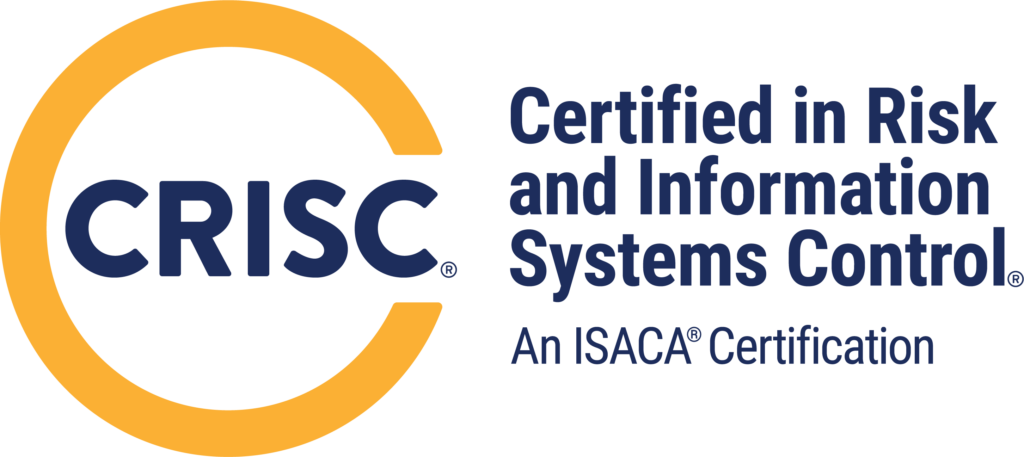Are you ready to elevate your expertise in risk management?
The Certified in Risk and Information Systems Control® (CRISC®) certification empowers you to become a risk management expert. By adopting a proactive approach based on Agile methodology, you’ll learn how to enhance your company’s business resilience, deliver stakeholder value, and optimize risk management across the enterprise.
What Is CRISC?
The Information Systems Audit and Control Association (ISACA), known by its acronym, offers the CRISC certification. This credential helps security professionals demonstrate their proficiency and understanding of IT risk’s impact on organizations. In today’s landscape of cyber vulnerabilities, effective remediation processes must align with an organization’s risk profile. CRISC stands out as the only professional certification focused on enterprise IT risk management.

Who Should Pursue CRISC?
CRISC certification is ideal for mid-career individuals working in IT/IS audit, risk, and cybersecurity. With over 30,000 CRISC-certified professionals in these fields, the credential opens doors to various roles, including:
- Risk Manager
- IT Security Specialist
- Senior Risk Analyst
- Compliance Auditor
- Security Analyst
- Risk Analyst
- Security Engineer
- Data Protection Officer
Why CRISC Matters
Earning a CRISC certification signifies that you possess essential skills for continuous risk monitoring and reporting. It enhances business resilience and boosts credibility with peers, stakeholders, and regulators. As a CRISC holder, you’re experienced in managing IT risk and designing, implementing, monitoring, and maintaining security controls.
More About ISACA
ISACA offers a suite of professional certifications, including CISA, CISM, CGEIT, CSX-P, and CDPSE. Founded in 1969, ISACA serves 145,000 members across 188 countries through its 220 chapters. It connects and supports 460,000 engaged information and cybersecurity professionals.
CRISC Domains
- Governance (26%):
- A—Organizational Governance:
- Organizational Strategy, Goals, and Objectives
- Organizational Structure, Roles and Responsibilities
- Organizational Culture
- Policies and Standards
- Business Processes
- Organizational Assets
- B—Risk Governance:
- Enterprise Risk Management and Risk Management Framework
- Three Lines of Defense
- Risk Profile
- Risk Appetite and Risk Tolerance
- Legal, Regulatory and Contractual Requirements
- Professional Ethics of Risk Management
- A—Organizational Governance:
- IT Risk Assessment (20%):
- A—IT Risk Identification:
- Risk Events (e.g., contributing conditions, loss result)
- Threat Modelling and Threat Landscape
- Vulnerability and Control Deficiency Analysis (e.g., root cause analysis)
- Risk Scenario Development
- B—IT Risk Analysis and Evaluation:
- Risk Assessment Concepts, Standards and Frameworks
- Risk Register
- Risk Analysis Methodologies
- Business Impact Analysis
- Inherent and Residual Risk
- A—IT Risk Identification:
- Risk Response and Reporting (32%):
- A—Risk Response:
- Risk Treatment / Risk Response Options
- Risk and Control Ownership
- Third-Party Risk Management
- Issue, Finding and Exception Management
- Management of Emerging Risk
- B—Control Design and Implementation:
- Control Types, Standards and Frameworks
- Control Design, Selection and Analysis
- Control Implementation
- Control Testing and Effectiveness Evaluation
- A—Risk Response:
- Information Technology and Security (22%):
- A—Information Technology Principles:
- Enterprise Architecture
- IT Operations Management (e.g., change management, IT assets, problems, incidents)
- Project Management
- Disaster Recovery Management (DRM)
- Data Lifecycle Management
- System Development Life Cycle (SDLC)
- Emerging Technologies
- B—Information Security Principles:
- Information Security Concepts, Frameworks and Standards
- Information Security Awareness Training
- Business Continuity Management
- Data Privacy and Data Protection Principles
- A—Information Technology Principles:
How Much Does CRISC Certification Cost?
The exam registration fees vary depending on your ISACA membership status. However, compared to other security certifications, the additional costs for CRISC are considered modest. ISACA offers various resources like review courses and practice exams to help you prepare, with costs varying depending on the format (online, in-person).
The Road to CRISC Certification: Preparing for Success
ISACA offers a CRISC online review course and instructor-led training to prepare you for the exam. Additionally, you can find practice exams and study materials from independent vendors.
Conclusion: Why CRISC Certification Matters
ISACA’s CRISC certification is a valuable credential for anyone passionate about information security risk management. Earning your CRISC demonstrates your commitment to excellence and positions you for career advancement and increased earning potential. The demand for skilled information security professionals is rapidly growing, and CRISC certification positions you to capitalize on this exciting trend.
Explore my journey to CRISC certification success by watching my video here: https://youtu.be/V287mfjLBP0?si=J1ZZslXN2zTkbShN
Very nice article Dushyant
Thanks Dushyant. I was confused whether to go for CRISC or CISA!!. It helped.